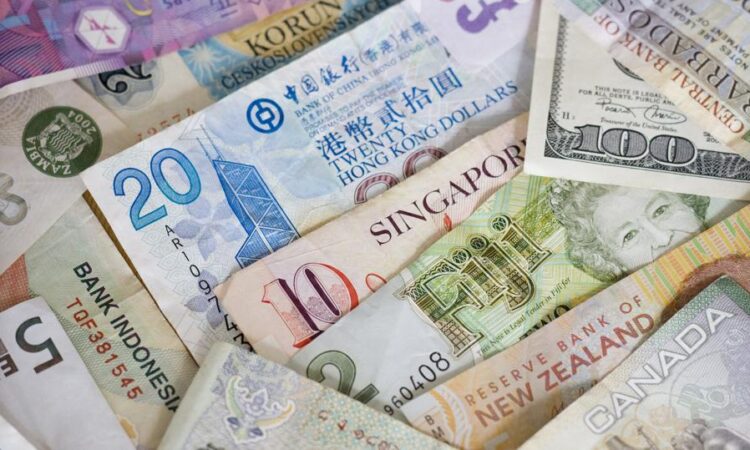
Editorial Note: We earn a commission from partner links on Forbes Advisor. Commissions do not affect our editors’ opinions or evaluations.
The U.S. dollar is a powerhouse among the world’s currencies: It’s the money that’s most traded on the global stage by a wide margin and is often used as a yardstick for comparing currencies.
The greenback may not be the world’s strongest currency—those bragging rights go to Kuwait’s dinar—but it’s up there near the top among the 180 or so traditional fiat currencies recognized as legal tender around the world. A fiat currency is money that isn’t tied to the worth of a physical commodity like gold or silver.
At the opposite end of the scale are the world’s least valuable currencies, which trade at tiny fractions of a dollar. Often you need tens of thousands of units of foreign money to get just $1. We’ve identified the 10 weakest currencies in the world, based on their relative value against the U.S. dollar.
Money Transfer Partners
How Is Foreign Currency Priced?
The world’s currencies trade in pairs. So, for example, you swap—more accurately, buy—U.S. dollars with Mexican pesos. This trading puts a price on one currency relative to another, and that price is called the exchange rate.
The majority of currencies are “floating,” meaning their value moves around in response to supply and demand factors. But some currencies are “pegged”: Their value against another currency, like the dollar, holds steady at an agreed-upon rate.
Exchange rates affect the cost of goods and services from one country to another.
When, say, the dollar strengthens against India’s rupee, American travelers to India can get more rupees for their dollars and effectively score cheaper vacations to see Mumbai or the Taj Mahal. But it becomes pricier for people from India to visit the U.S. because the rupee will buy fewer dollars at a foreign currency exchange.
Fluctuating exchange rates give investors opportunities to profit from trading in foreign currencies. How does that work? Check out our guide explaining the basics of foreign exchange movements.
What Are the World’s Top 10 Weakest Currencies?
Here are today’s 10 weakest international currencies, based on the amount of U.S. dollars that will buy one unit of each currency. We start with the currency with the lowest value relative to the dollar. The exchange rates are sourced from our currency converter, based on data from Open Exchange and are accurate as of May 26, 2023.
1. Iranian Rial (IRR)
The Iranian rial is the weakest currency in the world, with 1 rial buying a mere 0.000024 dollar (or, put another way, $1 equals 42,300 Iranian rials).
Iran’s currency has been squeezed by economic sanctions, including those the U.S. reimposed in 2018 and others the European Union has repeatedly imposed. Political unrest and an annual inflation rate that has been topping 40% are additional factors contributing to currency and economic weakness in Iran.
“Risks to Iran’s economic outlook remain significant,” the World Bank concludes.
2. Vietnamese Dong (VND)
The Vietnamese dong is the second-weakest currency in the world, with 1 dong buying 0.000043 dollar (or $1 equals 23,485 Vietnamese dong).
Vietnam’s currency has been undermined by a bad real estate market, restrictions on foreign investment and a recent slowdown in export activity.
Despite any shortcomings, the World Bank says Vietnam has been transforming “from one of the poorest in the world into a lower middle-income country. Vietnam now is one of the most dynamic emerging countries in [the] East Asia region.”
3. Laotian Kip (LAK)
The Laotian or Lao kip is No. 3 among the world’s weakest currencies, with 1 kip buying 0.000057 dollar (or $1 equals 17,692 Lao kip).
Just west of Vietnam, Laos and its kip have been hit by sluggish economic growth and crushing foreign debt obligations. Inflation, including higher prices for oil and other global commodities, has been worsened by declines in the kip—and, in turn, is helping push the currency even lower.
“Recent efforts by the government to bring inflation, debt and the country’s plummeting currency under control have been poorly considered and counterproductive,” notes the Council on Foreign Relations.
4. Sierra Leonean Leone (SLL)
The Sierra Leonean leone is the fourth-weakest currency in the world, with 1 leone buying 0,000057 dollar (or $1 equals 17,665 Sierra Leone leones).
High inflation—exceeding 43% in April 2023—plus economic weakness and hefty debt obligations are factors that have dragged down the currency of this West African nation. Observers say other problems affecting the country’s currency include: lingering effects of a 2010s Ebola outbreak and an earlier civil war; political uncertainty; and widespread public corruption.
“Sierra Leone’s economic development has been constrained by concurrent global and domestic shocks,” says the World Bank.
5. Lebanese Pound (LBP)
The Lebanese pound is fifth among the weakest currencies in the world, with 1 pound buying 0.000067 dollar (or $1 equals 15,012 Lebanese pounds).
In March 2023, the Lebanese pound sank to a record low against the U.S. dollar. The currency has been turning in a woeful performance against a backdrop of a deeply depressed economy, historically high unemployment, an ongoing banking crisis, political chaos and eye-popping inflation. Prices soared an estimated 171% in 2022.
“Lebanon is at a dangerous crossroads, and without rapid reforms will be mired in a never-ending crisis,” the International Monetary Fund noted in March 2023.
6. Indonesian Rupiah (IDR)
The Indonesian rupiah ranks No. 6 on this list of the world’s weakest currencies, with 1 rupiah buying 0.000067 dollar (or $1 equals 14,985 Indonesian rupiah).
The dismal ranking of the rupiah shows that bigger isn’t always better. Indonesia’s status as the world’s fourth most populous country can’t safeguard it against a beaten-up currency. Although the rupiah has demonstrated some strength in 2023 compared with its Asian counterparts, depreciation rocked the currency in previous years.
In March 2023, the International Monetary Fund cautioned that a global economic contraction could put renewed pressure on the rupiah.
7. Uzbekistani Som (UZS)
The Uzbekistani som is the seventh-weakest currency in the world, with 1 som buying 0.000088 dollar (or $1 equals 11,420 Uzbekistani som).
Since 2017, the Central Asian nation of Uzbekistan, a former republic of the Soviet Union, has been rolling out economic reforms. Still, the som remains a weak currency, held back by slowing economic growth, steep inflation, high unemployment, extensive corruption and chronic poverty.
“While the [Uzbekistani] economy has demonstrated resilience to the spillovers from the war in Ukraine and sanctions against Russia, significant uncertainty exists with regard to the evolution of these risks,” the Fitch Ratings agency said in March 2023.
8. Guinean Franc (GNF)
The Guinean franc is eighth among the weakest currencies in the world, with 1 franc buying 0.000116 dollar (or $1 equals 8,650 Guinean francs).
Despite an abundance of natural resources like gold and diamonds, Guinea—a nation in sub-Saharan Africa and a former French colony—has been plagued by high inflation that’s depressing the Guinean franc. Unrest against the country’s military rulers and a refugee influx from neighboring Liberia and Sierra Leone are contributing to Guinea’s deflated economy and currency.
“Political instability and a slowing global growth outlook will keep Guinea’s economic activity below potential (albeit still strong by regional standards) in 2023,” says the Economist Intelligence Unit.
9. Paraguayan Guarani (PYG)
The Paraguayan guarani is the world’s ninth-weakest currency, with 1 guarani buying 0.000138 dollar (or $1 equals 7,241 Paraguayan guaranies).
A single dam produces an overwhelming majority of the electricity used by Paraguay, but the country’s leadership in hydroelectric power hasn’t led to economic power. High inflation—approaching 10% in 2022—as well as drug smuggling and money laundering have diluted the currency and broader economy of Paraguay, a landlocked country in South America.
“The medium-term economic outlook [in Paraguay] remains favorable, but there are risks from a worsening global outlook and extreme weather events,” the International Monetary Fund explained in April 2023.
10. Ugandan Shilling (UGX)
The Ugandan shilling ranks No. 10 among the weakest currencies in the world, with 1 shilling buying 0.000267 dollar (or $1 equals 3,741 Ugandan shillings).
Despite being an oil-, gold- and coffee-rich country, Uganda and its currency have been hobbled by a record of unstable economic growth, sizable debt and political unrest. A flood of refugees from nearby Sudan has added to the strain.
“Uganda faces numerous challenges that could affect future stability, including explosive population growth, power and infrastructure constraints, corruption, underdeveloped democratic institutions and human rights deficits,” says the CIA.




